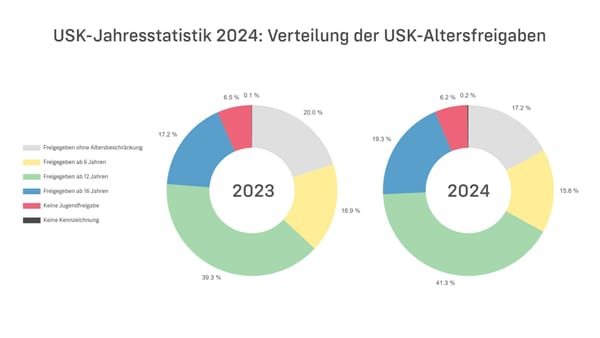Almost 30% of All Games Rated by USK in 2024 Contain ‘Risks of Use’




In 2024, the USK classified significantly fewer titles using the traditional rating procedure. This is reflected in the 2024 annual statistics, which provide interesting insights into the distribution of ratings and descriptors. Around one million USK labels were generated using the automated IARC system.
The USK’s annual statistics for 2024 are of particular interest. Established in 1994, the USK was also able to look back on 30 years of youth protection and age ratings in Germany, presenting some fascinating data. Since its founding, 55,514 titles have been examined using the traditional procedure, while around 16 million ratings have been issued online. Online games and apps are labeled using the IARC system, which was co-developed by the USK and is based on voluntary participation and a self-disclosure process that automatically generates a rating.
According to the USK statistics, around one million of these automated classifications were carried out in 2024. However, the USK statistics are particularly interesting regarding the traditional procedure. This is because, unlike in most other European countries, physically marketed games in Germany must be rated and labeled before they can be freely sold on the market.
In 2024, the number of games submitted to the USK declined further. A total of 1,515 classification procedures were carried out, compared to 1,876 in the previous year. The USK attributes this decline to the increasing digitalization of game distribution channels and the German government’s decision to stop funding games, as funded games must be reviewed by the USK.
When it comes to the distribution of age ratings, there were only slight shifts in individual classifications. As in 2023, more than three-quarters of all titles tested received a rating of ‘0+’, ‘6+’, or ‘12+’. The proportion of titles rated 18+ remained constant at 6.2%, compared to 6.5% in 2023.

"In 30 years, the USK has thoroughly examined over 55,000 titles as part of youth protection efforts. Since the introduction of the IARC system, 16 million additional ratings have been issued for online content. These figures not only demonstrate that the USK plays a crucial role in providing greater transparency in gaming, but also that it continuously integrates important new developments in youth protection through its structures and expert knowledge. Particularly regarding the inclusion of risks arising during use, the USK sets international standards and consistently develops practical solutions for protecting young people in the dynamic games market," says Elisabeth Secker, Managing Director of the USK, regarding the 2024 annual statistics.
The development of additional notes and descriptors indicating risks of use is also noteworthy. This allowed the USK, for example, to rate Balatro as 12+ with an additional note in 2024, while the PEGI system initially gave the title an 18+ rating (as reported). According to the USK, there are currently 24 additional notes indicating problematic content, as well as a series of descriptors for risks such as gambling-like mechanics and in-game purchases. The statistics show that nearly 30% of all games tested in 2024 contained such potential usage risks.

Never miss anything from the German, Swiss and Austrian games industry again: subscribe for free to our Daily newsletter and get all news straight to your inbox.








